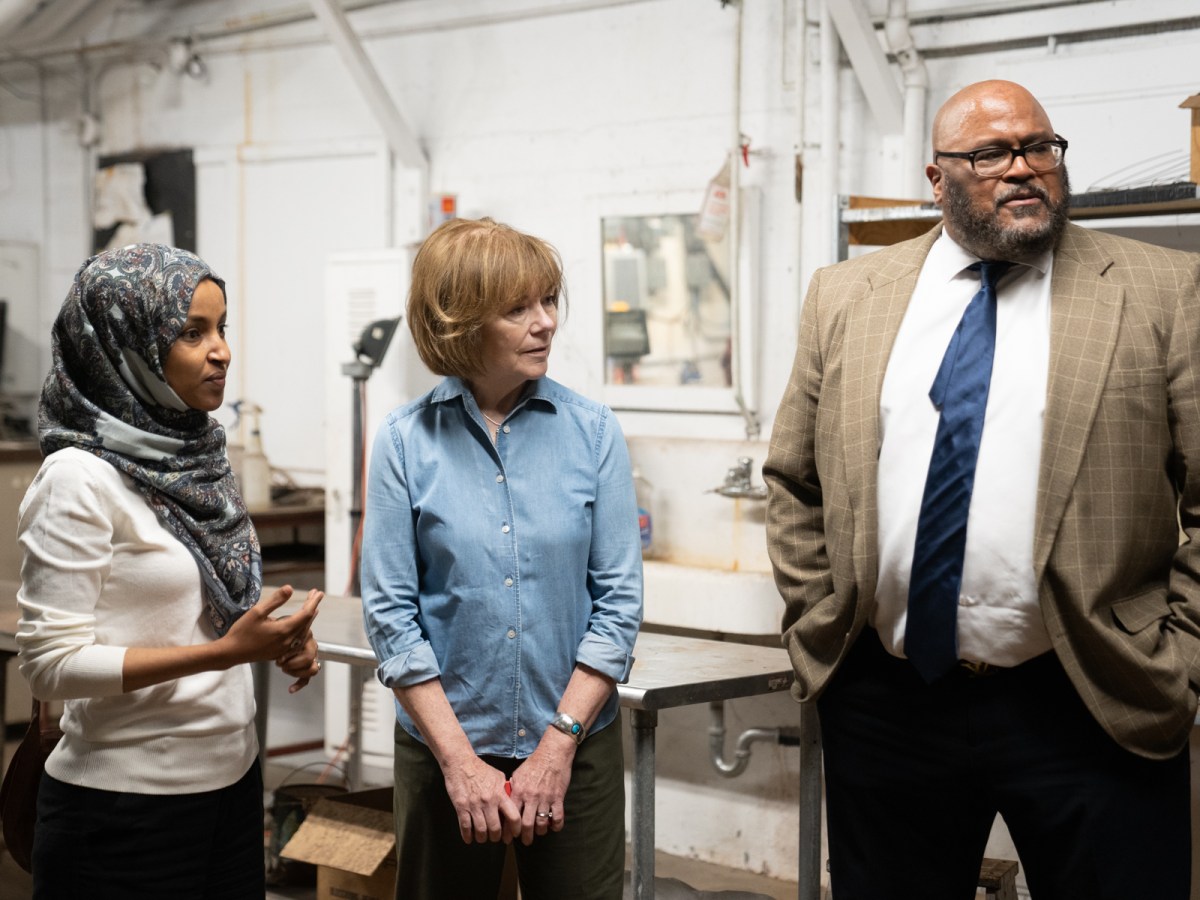A south Minneapolis metal foundry still needs to take additional steps to come into compliance with the Clean Air Act, federal officials say.
The Environmental Protection Agency (EPA) found a host of Clean Air Act violations during a surprise inspection at Smith Foundry last summer and says the facility still has work to do as part of an enforcement process.
That will take time, officials said—something that community residents, many of whom want the facility closed, expressed frustration over at a community meeting on Wednesday.
The foundry, located near Hiawatha Avenue in the East Phillips neighborhood, has made improvements to its facility since it was notified of violations in August, according to Brian Dickens, chief of air enforcement and compliance for EPA Region 5. But the enforcement action continues, he said.
“There are some items stated in the notice of violation that we don’t have confirmation they’ve returned to compliance,” Dickens told residents at Wednesday’s meeting.
Test results released by state and federal officials last week showed that Smith Foundry’s pollution mitigation equipment is working properly, according to the Minnesota Pollution Control Agency (MPCA).
Those tests, conducted in mid-December, evaluated filtration equipment known as baghouses. During its inspection last May, the EPA found some of the foundry’s baghouses weren’t working properly and lacked required recordkeeping.
The tests also showed the facility is emitting lead. The MPCA said lead levels were low, but several residents expressed fear of those emissions, citing EPA standards that state there is no safe level of lead exposure.
Smith Foundry replaced three of the five baghouses in the weeks leading up to the December testing, according to an EPA inspection report. Issues with baghouses represent three of the nine Clean Air Act violations found by the EPA.
Other violations included failure to control airborne particulate matter pollution—which the agency found was leaking through cracks in ductwork, doors, and windows—and failure to comply with emission limits in metal casting and pouring operations.
At Wednesday’s meeting, residents continued to express doubts that the foundry can safely operate in a residential neighborhood. They emphasized areas of Smith Foundry’s operation that lack pollution control. Inspection reports from last May and December note that emissions from the furnace and metal-pouring operations in the foundry are uncontrolled. In written communication to the EPA, foundry officials said pollution control equipment for the furnace will be needed.
Official: Enforcement ‘just takes time’
Enforcement actions can go on for several months, Dickens said. Each enforcement process is different, but can often result in fines and requirements for the offender to complete a supplemental environmental project intended to bring tangible benefits to the community.
“It just takes time to get to the very end,” Dickens said.
Smith Foundry was purchased by Zynik Capital, a Canadian investment firm, in late 2022. The EPA violations occurred over a five-year period from 2018 to May 2023. Smith Foundry president Adolfo Quiroga said the company has made investments in improving the facility and believes the test results show the foundry’s commitment to being a good neighbor.
“We look forward to continuing to work with state and federal regulators and engage with the community as we continue to complete our application for a new air permit,” Quiroga said in a prepared statement.
Neighbors continue calls for closure
East Phillips residents and environmental justice advocates continued to call for the state to revoke Smith Foundry’s permit and shut the facility at Wednesday’s community meeting, which was hosted by the MPCA.
“It’s been causing harm for way too long,” said Vinny Dionne, East Phillips resident and member of the Little Earth Protectors, a group that advocates for the neighborhood’s urban Native American community.
“It’s been causing harm for way too long.”
Vinny Dionne, East Phillips resident
The MPCA intended the meeting to be an open-house style split into afternoon and evening sessions. The agency arranged the East Phillips Community Center gym into a group of tables where the public could ask questions about Smith Foundry’s air permit process, pollution monitoring, or learn about health impacts in environmental justice communities.
But attendees of the afternoon session rejected that premise, and insisted that regulators take questions from the public in one large group. They asked repeatedly why the agency wasn’t acting more aggressively to close Smith Foundry.
The state believes that step would result in a long court process unlikely to succeed, according to MPCA assistant commissioner Frank Kohlasch.
“We don’t feel like we have the evidence that would stand up in front of a judge right now,” Kohlasch said.
RELATED STORIES
Smith Foundry would not be allowed to be built in a residential neighborhood today, but it is grandfathered into the neighborhood by historical zoning practices that concentrated heavy industry near low-income communities of color.
It started operating 100 years ago and is using a permit approved by the MPCA in January 1992. The permit was supposed to be effective for five years. But 32 years later, it remains in place. Smith Foundry has operated on an “application shield” since 1995, when it last submitted an application for a new permit, according to the MPCA.
The agency started work on a new permit for Smith Foundry in 2016, and expects to have it approved by the end of 2024.
Asked by neighbors why they should trust the state to write a strong permit now, MPCA officials acknowledged past shortcomings.
“We have not lived up to our responsibility there,” Kohlasch said.
“We have not lived up to our responsibility there.”
Frank Kohlasch, MPCA assistant commissioner
Tania Rivera, who works at the Círculo de Amigos Child Care Center close to the foundry, said she is concerned about the pollution and its impacts. It’s scary to take children outside and not know what they’re exposed to, she said.
“Why is it always East Phillips?” Rivera asked.






